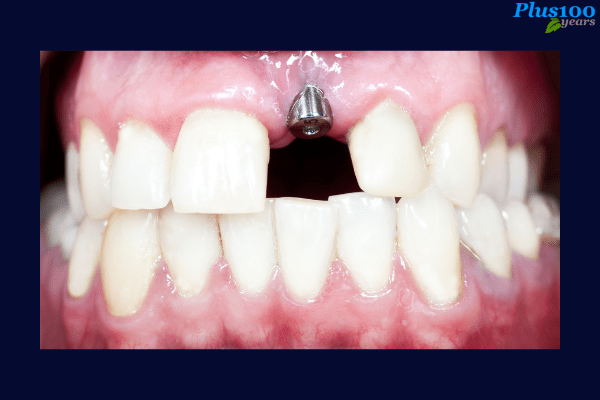A titanium alloy dental implant serves as a prosthetic tooth root. This prevents jaw bone loss by taking over the role of a natural tooth root. A permanent abutment and crown are then placed on top of the implant after it has fused with your jaw.
A titanium alloy dental implant serves as a prosthetic tooth root. This prevents jaw bone loss by taking over the role of a natural tooth root.
A permanent abutment and crown are then placed on top of the implant after it has fused with your jaw. The result is a dental implant that feels and looks like a natural tooth.
What kinds of dental implants are there?
The diameter of full-sized dental implants ranges from 3.4 to 5.8 mm. Mini dental implants, however, range in size from 1.8 to 3.0 mm.
The size difference influences your procedure’s degree of invasiveness and length of recovery.
Mini implants need less jaw bone density to be inserted since they are smaller. A ball is attached to the end of a micro implant so that the crown may snap into place.
This crown will have a socket below it so that the implant may be attached to it securely. Implants may support a removable denture.
However, all-on-6 implants firmly anchor a dental arch to your jaw. Treatment for dental implants typically involves following the steps:
- Consultation- During your consultation, your dentist will assess your oral health and discuss your smile makeover treatment options ie Endosteal implant, Subperiosteal Implant, Zygomatic Implant, All-on-4 Implant, and Mini Dental Implants.
- Implant Placement- During this procedure, your dentist will place the dental implant into your jawbone.
- Healing Period- After the implant had been placed, you will need to wait for the implant to heal and for the jawbone to fuse around it. This process usually takes several weeks or months.
- Attaching the Abutment- Once the implant has healed, your dentist will attach an abutment, Which is a small metal post that connects the implant to the artificial tooth.
- Placing the Artificial Tooth- Finally, your dentist will place the artificial tooth onto the abutment.
This may be a crown, bridge, or denture, depending on your individual needs and treatment plan.

What are the prices of dental implants?
According to Levin, dental implants Plymouth MA run between $3,000 and $4,500 from beginning to end. The cost of implants for the full mouth might range from $60,000 to $90,000.
The diversity of oral diseases causes the large price range of dental implants. Others may not need further treatments like a sinus lift or bone transplant.
The prices of dental implants can indeed vary significantly from place to place. The cost of dental Meridian, Idaho, for example, should be different than the cost of dental implants in Dunedin, Florida.
Advantages and disadvantages of dental implants:
A person who requires dental implants in Plymouth MA may see a considerable improvement in their health and quality of life. But issues might occasionally happen.
Dental implant complications might happen immediately or take a long time to manifest. Some issues lead to implant failure (usually defined as implant looseness or loss).
If an implant fails, further surgery may be required to repair or replace the implant system.
Advantages:
- The aesthetic look is restored
- Regains chewing abilities
- Prevents the jawbone from contracting as a result of bone loss
- Helps maintain the stability of neighboring teeth.
- Keeps the surrounding bone and gums healthy.
Disadvantages:
- Surgery-related tissue damage, such as sinus perforation, may occur.
- Neighboring natural teeth are harmed when implants are inserted
- A surgical injury (for example, fracture of the surrounding jawbone)
- Due to the abutment screw loss, a tooth may feel loose or seem to be twisting in place.
- Inadequate performance, such as the perception that the teeth do not generally bite together
Options besides dental implants:
Although Dental Implants In London have a long history of success, they can fail because the surrounding bone doesn’t integrate properly.
Your dentist must remove the implant in a few months and try again. In most cases, the dentist will repair it for free if the implant fails within the first year.
A typical bridge to replace one or more lost teeth or dentures, which are “fake teeth” to replace all upper and/or lower teeth, are two possibilities you may wish to consider at that moment.

